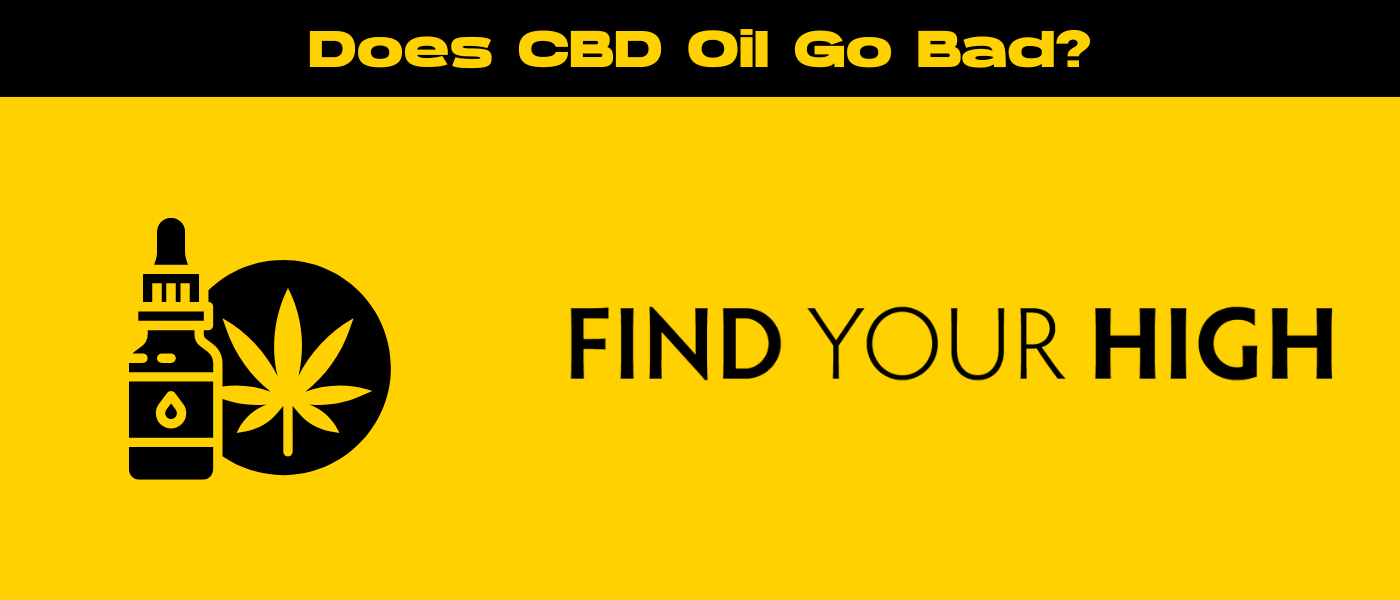In recent years, CBD oil has increased in popularity as more people search for natural remedies to health issues like anxiety, chronic pain, and sleep disorders.
Derived from the cannabis plant, this non-psychoactive oil is now part of many daily routines, offering wellness benefits without the ‘high’ associated with THC. However, as its use grows, it’s important to ask: does CBD oil go bad over time? In other words, does CBD oil expire?
Knowing the shelf life and how to properly store CBD oil is key to keeping it effective. This blog will explore what affects CBD oil’s expiration, how to spot signs of degraded oil, the best storage methods, and tips to extend its shelf life. By the end, you’ll know how to get the most out of your CBD oil.
Let’s get started!
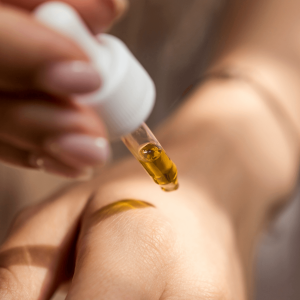
What is CBD Oil?
Short for cannabidiol oil, CBD oil is a natural extract from the hemp or cannabis plant. Unlike THC (tetrahydrocannabinol), CBD is non-psychoactive, so it doesn’t produce the same psychoactive effects associated with marijuana. Nonetheless, CBD is one of over 100 cannabinoids in the cannabis plant and is better known for its potential therapeutic benefits.
Extracting CBD oil involves several steps to ensure purity and potency. First, the hemp flower undergoes CO2 extraction, considered the gold standard, or solvent-based extraction using ethanol or other solvents. After extraction, the crude oil is refined to remove any leftover plant materials, wax, and chlorophyll, resulting in concentrated CBD oil for various products. Compared to other hemp products, such as raw hemp flower, which contains a mix of cannabinoids and terpenes, and hemp seed oil, which is extracted from the seeds and is rich in nutrients but lacks cannabinoids, CBD oil is specifically processed to maximize its therapeutic potential.
CBD oil is commonly used to address various health issues. Its anti-inflammatory properties make it popular for pain relief, especially for chronic pain conditions like arthritis. Additionally, CBD may help reduce anxiety and stress, aid sleep disorders, and even offer heart health benefits due to its antioxidative and anti-inflammatory properties.
From tinctures and edibles to topicals and capsules, CBD oil provides a versatile approach to wellness that can be easily integrated into daily routines.
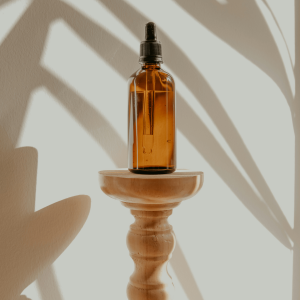
Shelf Life of CBD Oil
The term “shelf life” refers to the length of time a product remains effective and safe for use. CBD oil shelf life ranges between 1 to 2 years.
Several factors can influence this shelf life, including the quality of the CBD, the methods used for extraction, and any additional ingredients mixed with the oil.
Signs Your CBD Oil Has Gone Bad
- Change in Color: Fresh CBD oil often has a clear or light color, while expired oil may turn darker, indicating oxidation and degradation.
- Altered Smell and Taste: Fresh CBD oil usually has a mild, earthy aroma. If the oil starts to degrade, you might notice a rancid smell or a significantly different taste that can be unpleasant.
- Consistency Changes: Over time, CBD oil may change from its original clear consistency to become cloudy or thicker, suggesting it has started to break down.
Factors Affecting CBD Oil’s Shelf Life
Extraction Method
The extraction method used to obtain CBD oil plays a significant role in its shelf life.
CO2 extraction stands out as the gold standard for ensuring the longevity of CBD oil. This method uses supercritical CO2 to extract CBD without introducing harmful chemicals, resulting in a purer and more stable product.
On the other hand, solvent extraction involves the use of substances like ethanol or butane, which can leave residual solvents in the final product. These residues can accelerate degradation, making CO2 extraction the better choice for extending the shelf life of CBD oil.
Quality of Ingredients
The quality of the ingredients used in CBD oil, including the base oil and any additional compounds, greatly impacts its freshness and longevity.
High-quality hemp, free from pesticides and heavy metals, ensures a cleaner, longer-lasting product.
Similarly, the base oils used to dilute CBD oil, such as MCT oil, hemp seed oil, or olive oil, should be of premium quality. Inferior oils are more prone to oxidation, which can shorten the shelf life.
Clean extraction processes that remove impurities and ensure a concentrated, pure product also contribute to the extended shelf life of CBD oil.
Storage Conditions
Proper storage is crucial for maintaining the effectiveness and safety of CBD oil over time. The oil should be stored in cool, dark places, such as a pantry or a closet, away from direct sunlight and heat sources.
Exposure to temperature fluctuations, light, and air can significantly hasten the degradation process, leading to a reduction in potency and efficacy. Therefore, it’s advisable to use dark glass bottles, which act as a barrier against light, over clear plastic containers.
These practices help minimize oxidation and protect the essential compounds within the CBD oil, ensuring it remains effective for as long as possible.
Can You Use Expired CBD Oil?
Using expired CBD oil is generally not recommended due to several potential risks. Over time, the chemical composition of CBD oil changes, leading to a significant loss of potency and efficacy.
What’s more, degradation of the oil can result in the formation of harmful byproducts that may pose health risks.
Loss of Potency
One of the major concerns with expired CBD oil is its reduced potency. As the oil breaks down, the concentration of CBD diminishes, making it less effective for managing symptoms like pain, anxiety, and sleep disorders. This can lead to a wasted effort and expense, as you may not experience the same therapeutic benefits you expect from fresh CBD oil.
Potential Side Effects
Expired CBD oil can also cause several potential side effects:
- Digestive Issues: Degraded oil may cause stomach discomfort, nausea, or even diarrhea. This is particularly concerning for people with sensitive digestive systems.
- Allergic Reactions: As the oil degrades, new compounds that were not present initially can form. These compounds may trigger allergic reactions, including skin rashes, itching, or more severe responses.
- Altered Taste and Smell: An unpleasant, rancid taste and smell can not only make the oil difficult to consume but also indicate the presence of harmful oxidation products.
Given these risks, it is advisable to avoid using CBD oil past its expiration date. Instead, invest in fresh, high-quality CBD oil and follow proper storage guidelines to maximize its longevity and efficacy.
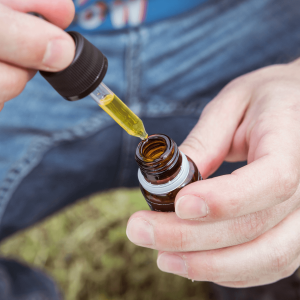
How to Extend the Shelf Life
Keeping the Bottle Sealed
Keeping the bottle sealed when not in use is key to preserving your CBD oil’s quality. Air exposure accelerates degradation through oxidation, reducing the oil’s potency and effectiveness.
Always screw the cap tightly after each use and avoid leaving the bottle open for long periods. If the original seal is broken, transfer the oil to another airtight container to keep it fresh.Optimal
Temperature & Location
Storing CBD oil at the right temperature helps extend its shelf life. The best range is between 60 and 70 degrees Fahrenheit (15-21 degrees Celsius).
Good storage spots at home include a pantry, closet, or cupboard—cool, dry places away from sunlight and heat sources like stoves or radiators. Avoid places with big temperature changes, like bathrooms or refrigerators, as these can harm the oil’s stability and potency.
Reducing Light Exposure
Light, particularly UV light, can significantly damage CBD oil by accelerating the breakdown of cannabinoids and other valuable compounds.
To protect your CBD oil from light exposure, store it in opaque or tinted bottles that act as a barrier against harmful rays. These types of containers are designed to shield the oil, preserving its effectiveness for a longer period.
Additionally, when storing the bottle, ensure it’s kept in a dark place, away from windows or other light sources.
Avoiding Contamination
Maintaining cleanliness when using CBD oil is essential to avoid contamination. Make sure to use a clean dropper every time and avoid letting the dropper touch your fingers, mouth, or any other surfaces that could introduce bacteria.
If you use the oil regularly, consider wiping the dropper with an alcohol swab before and after use to ensure it’s free of contaminants. Taking these precautions will help maintain the purity of the oil and extend its shelf life.
Choosing High-Quality CBD Oil
Choosing long-lasting CBD oil requires considering several factors to ensure the product is effective and safe.Here are some tips for choosing high-quality CBD oil:
- Check the Source of Hemp: Opt for CBD oil derived from organically grown hemp that is free from pesticides, herbicides, and heavy metals. Organic cultivation practices are not only better for the environment but also result in a purer, cleaner product.
- Look for CO2 Extraction: Choose products that use CO2 extraction methods. This process is considered one of the safest and most effective ways to extract CBD, as it avoids the use of harmful solvents that can leave residues in the oil.
- Examine the Ingredient List: High-quality CBD oil should contain minimal and natural ingredients. Avoid oils with artificial additives, preservatives, or flavors, which can affect both effectiveness and shelf life.
- Review Lab Test Results: Reputable brands provide third-party lab test results, often referred to as certificates of analysis (COAs). These tests confirm the cannabinoid content, including the presence of THC (if any), as well as the absence of contaminants like heavy metals, pesticides, and solvents.
- Consider the Carrier Oil: Pay attention to the type of carrier oil used. Premium options like MCT oil, hemp seed oil, coconut oil, or olive oil are preferred as they enhance bioavailability and stability, contributing to a longer shelf life.
- Evaluate Brand Reputation: Purchase CBD oil from well-known, reputable brands with positive customer reviews. Established companies are more likely to adhere to high standards of quality and transparency.
- Assess Packaging: Quality CBD oils are typically packaged in dark glass bottles to protect the oil from light degradation. Ensure the packaging is also airtight to prevent exposure to air, which can accelerate oxidation.
Image: https://unsplash.com/photos/a-woman-holding-a-small-bottle-of-essential-oils-SrpX7KTjz34?utm_content=creditShareLink&utm_medium=referral&utm_source=unsplash Alt text: woman holding small amber bottle of hemp oil
Why Reputable Brands and Lab-Tested Products Are Preferable
Choosing CBD oil from reputable brands and ensuring it is lab-tested is crucial for several reasons:
- Consistency and Reliability: Reputable brands are more likely to offer products that consistently meet quality standards, ensuring you get the same potency and benefits with every purchase.
- Safety Assurance: Lab-tested products guarantee that the oil is free from harmful contaminants and that the cannabinoid content matches what is advertised. This transparency is essential for your safety and well-being.
- Legal Compliance: Established brands are more likely to comply with legal standards, ensuring that their products contain legal levels of THC and do not pose any risks of psychoactive effects or legal issues.
- Customer Support: Trusted brands usually have better customer support systems in place to address any concerns or questions you may have about their products, ensuring a better overall experience.
Conclusion
Proper storage and handling of CBD oil are vital for maintaining its potency, effectiveness, and safety. Keep the bottle sealed, store it in a cool and dark place, minimize light exposure, and avoid contamination to extend its shelf life.
When buying CBD oil, always choose high-quality, lab-tested products from reputable brands to ensure safety and effectiveness. Following these practices not only preserves your CBD oil’s integrity but also maximizes its benefits, making your investment worthwhile.
A little care and attention ensure you get the full advantages of this natural supplement.
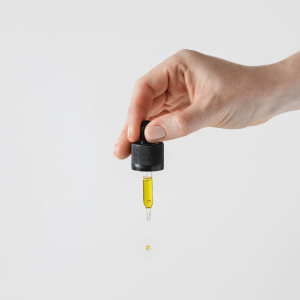
FAQs
1. How long does CBD oil usually last?
CBD oil can typically last between one to two years if stored properly. Factors such as the quality of the oil, storage conditions, and exposure to light and air can influence its shelf life. By keeping the oil in a cool, dark place and ensuring the bottle is tightly sealed, you can help extend its longevity.
2. Does CBD oil need to be refrigerated?
Refrigeration is not necessary for CBD oil, but it can help extend its shelf life, especially in warmer climates. If you choose to refrigerate it, ensure the oil is allowed to return to room temperature before use to maintain its consistency and potency. However, storing the oil in a cool, dark place is generally sufficient to keep it stable.
3. Does tincture oil expire?
Yes, tincture oil, including CBD tinctures, does expire. Over time, the cannabinoids and other compounds in the oil may degrade, reducing its effectiveness. Most CBD tinctures will come with an expiration date on the bottle, typically ranging from one to two years from the date of manufacture. Proper storage can help ensure that the oil remains potent up until this date.
4. Does CBD oil taste rancid?
High-quality CBD oil should not taste rancid. It generally has a slightly earthy or nutty flavor, which can vary depending on the carrier oil used. If your CBD oil tastes off or rancid, it may be a sign that it has gone bad due to improper storage or has reached its expiration date. Always check the smell and taste before use; if it seems unusual, it’s best to dispose of the oil.

 Rewards
Rewards




